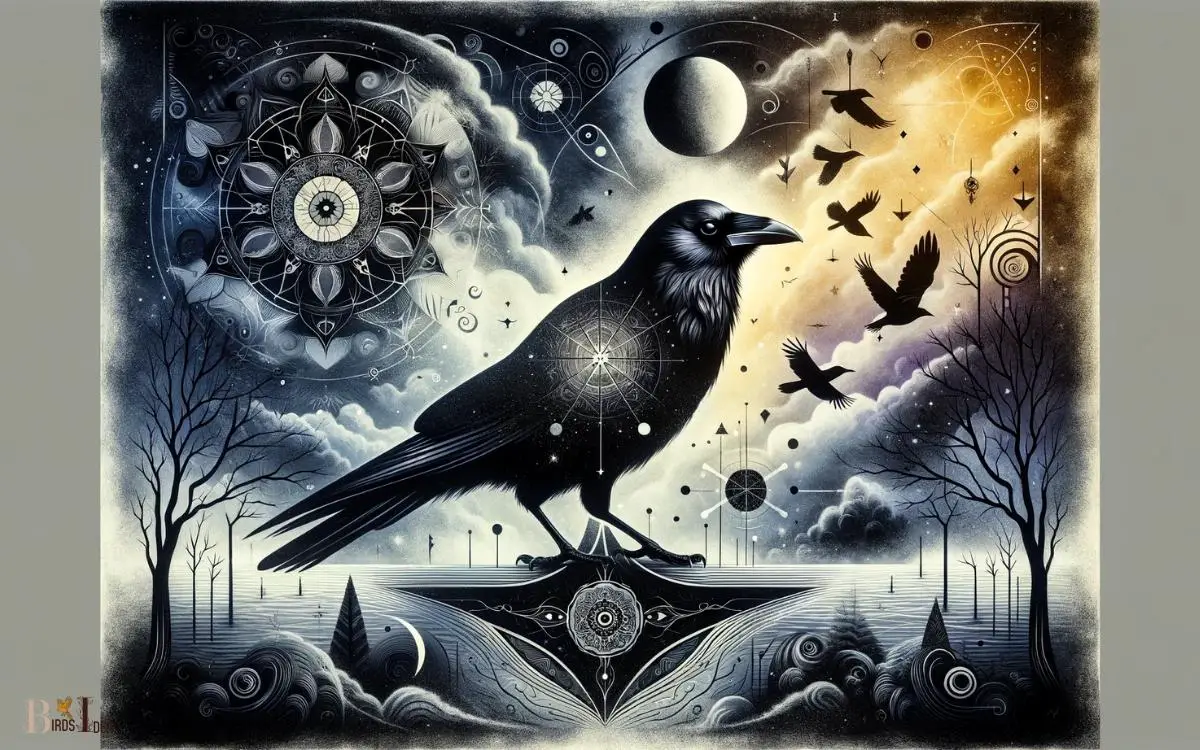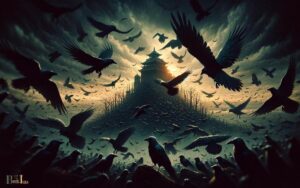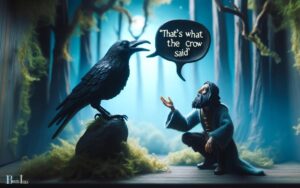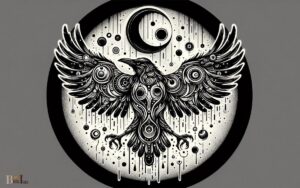What Do Black Crows Mean: Discover!
Black crows are often associated with various symbolic meanings across different cultures, including mystery, intelligence, transformation, and even death.
Their appearance in folklore, mythology, and everyday life has led to a diverse range of interpretations, with some viewing them as omens of good fortune or change, while others regard them as messengers of the spiritual world.
The symbolism of black crows varies widely:
For example, in Norse mythology, Odin’s two crows, Huginn and Muninn, symbolize thought and memory, respectively, and are said to fly all over the world, bringing information back to their master.
Crows hold a mirror to the vast tapestry of human culture, reflecting an array of beliefs and emotions. Their black plumage and enigmatic behavior continue to inspire curiosity and awe.

Key Takeaway
Cultural Symbolism of Black Crows
The cultural symbolism of black crows is deeply rooted in various societies and is often associated with both positive and negative connotations.
In many cultures, black crows are seen as a symbol of mystery and intelligence. They are often associated with magic, the unknown, and the supernatural.
However, in some societies, they are also linked to death, bad omens, and dark forces. The duality of these associations reflects the complexity of human perceptions and beliefs.
Despite the negative connotations, black crows have also been revered for their resourcefulness and adaptability.
Their appearance in myths, folklore, and literature across different cultures showcases the enduring fascination and significance of these birds.
The cultural symbolism of black crows thus encompasses a wide spectrum of interpretations, making them a captivating subject of study and contemplation.
Mythological Associations With Crows
Mythological associations with crows have a rich and diverse history across different cultures. From ancient mythology to modern folklore, crows have held significant symbolic meaning.
Exploring their cultural significance, their portrayal in folklore, and their symbolism in various cultures provides a fascinating insight into the enduring allure of these enigmatic birds.
Cultural Significance of Crows
How have cultural beliefs and mythological associations shaped the significance of crows in different societies? Crows have held diverse and often contradictory meanings across different cultures.
In some Native American traditions, crows are revered as symbols of wisdom and intelligence, often associated with the spirit world and revered as powerful omens.
In contrast, ancient European folklore often portrays crows as harbingers of doom and death. In Hindu mythology, the crow is considered a messenger that can travel between the worlds of the living and the dead.
In Japanese folklore, the Yatagarasu, a three-legged crow, is seen as a symbol of guidance and divine intervention.
These varied cultural associations demonstrate the complexity of human perceptions and the enduring significance of crows in the collective imagination.
Crows in Folklore
Cultural beliefs and mythological associations have contributed to the multifaceted meanings attributed to crows, with a multitude of societies ascribing diverse and often contradictory significance to these enigmatic birds.
In various folklore traditions, crows have been depicted as symbols of wisdom and intelligence.
In Norse mythology, they were believed to be the eyes and ears of the god Odin, while in Celtic folklore, they were associated with the goddess Morrigan, often seen as a symbol of prophecy and protection.
However, in some cultures, crows have been linked to darker themes such as death and bad omens. For example, in Greek mythology, they were associated with the god of war, Ares.
These conflicting mythological associations with crows reflect the complex and varied interpretations of these creatures across different societies.
Symbolism in Different Cultures
The mythological associations of black crows vary widely across different cultures, embodying diverse symbolism and significance.
In various mythologies and belief systems, crows hold different symbolic meanings, reflecting the cultural contexts in which they are found.
Some of the mythological associations with crows include:
- Western Culture: In Western folklore, crows are often associated with death and the afterlife, symbolizing the mysterious and the unknown.
- Native American Culture: Many Native American tribes view crows as symbols of transformation and change, often representing the ability to move between the physical and spiritual worlds.
- Asian Culture: In some Asian cultures, crows are revered as symbols of wisdom and intelligence, often depicted as oracles and messengers of the gods.
These diverse mythological associations highlight the rich and varied symbolism of crows across different cultures.
Superstitions and Folklore Surrounding Crows
Superstitions and folklore surrounding crows have long persisted in various cultures around the world, influencing beliefs and traditions.In many cultures, crows are associated with both positive and negative superstitions.
For example, in some Native American traditions, crows are seen as wise and intelligent beings, while in European folklore, they are often associated with bad omens and death.
In Japanese folklore, crows are seen as messengers of the gods. In Celtic mythology, they are associated with battlefields and war.
The superstitions and folklore surrounding crows have contributed to a rich tapestry of cultural beliefs, influencing everything from literature to rituals.
Despite the differing interpretations, one commonality remains: crows continue to capture the human imagination with their mysterious and complex symbolism.
Crows in Literature and Art
In various literary works and artistic expressions, crows are frequently portrayed as enigmatic symbols, embodying both positive and negative connotations that reflect the diverse cultural beliefs and superstitions surrounding them.
Crows have been featured in various forms of creative expression, serving as powerful metaphors and symbols.
Some notable examples include:
- Literature: Crows have been depicted in classic literature, such as Edgar Allan Poe’s famous poem ‘The Raven,’ where the raven serves as a symbol of ominous foreboding.
- Art: Renowned artists like Francisco Goya and Kawanabe Kyosai have incorporated crows into their works, using them to convey themes of death, mystery, and the supernatural.
- Folklore: Crows are prevalent in folklore and mythology, often representing intelligence, trickery, or even divine messengers.
These representations highlight the enduring fascination with crows and their complex symbolism in human culture.
As we delve into modern interpretations of black crows, it becomes evident that these enigmatic birds continue to captivate and intrigue us in contemporary art and literature.
Modern Interpretations of Black Crows
As we explore modern interpretations of black crows, we will examine their symbolism in folklore, their cultural significance today, and the misconceptions and truths surrounding these enigmatic birds.
From their representation in mythology and literature to their role in contemporary society, black crows continue to captivate and intrigue.
By delving into these points, we can gain a deeper understanding of the multifaceted meanings attributed to these creatures.
Symbolism in Folklore
Modern interpretations of black crows in folklore often highlight their symbolic significance as harbingers of change, intelligence, and mystery.
In modern folklore, black crows are commonly associated with the following symbolic meanings:
- Harbingers of Change: Black crows are often seen as symbols of transformation and new beginnings, signaling the need for adaptation and embracing change.
- Intelligence and Wisdom: Crows are known for their exceptional problem-solving abilities and keen intelligence. In folklore, black crows are often revered as symbols of wisdom and knowledge.
- Mystery and Magic: Due to their dark plumage and enigmatic behavior, black crows are frequently associated with mystery and the supernatural in modern folklore, captivating the imagination of those who seek freedom from the mundane.
Black crows continue to hold a significant place in modern folklore, representing ideas of transformation, wisdom, and the mystical.
Cultural Significance Today
The cultural significance of black crows today continues to resonate, with their symbolism as harbingers of change, intelligence, and mystery pervading various aspects of contemporary society.
In modern times, black crows are often associated with intelligence and adaptability due to their problem-solving abilities and complex social structures.
They are also seen as symbols of change and transformation, representing the ability to navigate through life’s challenges and adapt to new circumstances.
Black crows are often featured in popular culture, literature, and art, further solidifying their place in modern symbolism.
Their enigmatic nature continues to captivate the imagination, making them a powerful symbol in today’s society.
However, misconceptions about black crows also persist and it is important to distinguish between myths and truths regarding their symbolism.
Misconceptions and Truths
Despite their widespread cultural significance, misconceptions about black crows persist, necessitating a careful examination of their symbolism in modern society. In today’s context, the symbolism of black crows is often misunderstood.
Here are some misconceptions and truths about the modern interpretations of black crows:
Misconception: Black crows are harbingers of death and misfortune.
- Truth: In many cultures, black crows are seen as symbols of intelligence, adaptability, and resourcefulness.
Misconception: Black crows are associated with dark magic or witchcraft.
- Truth: Black crows are revered for their keen perception and are often seen as messengers from the spirit world.
Misconception: Black crows are omens of bad luck.
- Truth: Black crows can symbolize transformation and rebirth, bringing messages of positive change and growth.
Conclusion
The cultural symbolism, mythological associations, superstitions, folklore, literature, and art surrounding black crows demonstrate the enduring significance of these birds in human society.
Modern interpretations and scientific studies highlight the intelligence and adaptability of crows.
For example, a study conducted at the University of Auckland showed that crows are able to solve complex puzzles and use tools to obtain food, showcasing their remarkable cognitive abilities.






